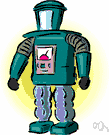robot
(redirected from robotry)Also found in: Thesaurus, Medical, Financial, Encyclopedia.
ro·bot
(rō′bŏt′, -bət)n.
1. A mechanical device that sometimes resembles a human and is capable of performing a variety of often complex human tasks on command or by being programmed in advance.
2. A machine or device that operates automatically or by remote control.
3. A person who works mechanically without original thought, especially one who responds automatically to the commands of others.
4. A form of urban dance involving a succession of separate movements executed with precision in imitation of a robot.
ro·bot′ic adj.
Word History: Robot has been in English since 1923, when Karel Čapek's 1921 play R.U.R. was translated into English from Czech and presented in London and New York. The play's title, R.U.R., is an abbreviation of Rossum's Universal Robots, the name of a corporation in the play that makes robots to serve as slave labor for humanity. However, Čapek's robots—the original robots—are quite different from the standard-issue robots of later 20th-century science fiction, such as C3PO and R2D2 of Star Wars, that seem to be assembled from metal, silicon, and other non-biological materials. Čapek's robots are assembled out of something like flesh and blood, made according to a secret formula. Their flesh is mixed like dough in mixing machines and their nerves and veins are spun out on spinners. Eventually, during the course of the play, the robots grow tired of their subservient position and stage a rebellion that places the very future of humanity in peril. The robots take over the world, but it becomes clear that they also feel emotions like love and are worthy successors to humanity. Robot and robotka, the words Čapek uses in Czech for the male and female versions of these sentient biological automatons, are derived from the Czech word robota, "servitude, forced labor."
American Heritage® Dictionary of the English Language, Fifth Edition. Copyright © 2016 by Houghton Mifflin Harcourt Publishing Company. Published by Houghton Mifflin Harcourt Publishing Company. All rights reserved.
robot
(ˈrəʊbɒt)n
1. (General Engineering) any automated machine programmed to perform specific mechanical functions in the manner of a human
2. (General Engineering) (modifier) not controlled by man; automatic: a robot pilot.
3. a person who works or behaves like a machine; automaton
4. South African a set of traffic lights
[C20: (used in R.U.R., a play by Karel Čapek) from Czech robota work; related to Old Slavonic rabota servitude, German Arbeit work]
roˈbotic adj
ˈrobotism, ˈrobotry n
ˈrobot-ˌlike adj
Collins English Dictionary – Complete and Unabridged, 12th Edition 2014 © HarperCollins Publishers 1991, 1994, 1998, 2000, 2003, 2006, 2007, 2009, 2011, 2014
ro•bot
(ˈroʊ bət, -bɒt)n.
1. a machine that resembles a human and does mechanical, routine tasks on command.
2. a person who acts and responds in a mechanical, routine manner; automaton.
3. any machine or mechanical device that operates automatically with humanlike skill.
[< Czech, coined by Karel Čapek in the play R.U.R. (1920) from the base robot-, as in robota compulsory labor, robotník peasant owing such labor]
ro•bot′ic,
adj.
Random House Kernerman Webster's College Dictionary, © 2010 K Dictionaries Ltd. Copyright 2005, 1997, 1991 by Random House, Inc. All rights reserved.
ro·bot
(rō′bŏt′) A machine that can perform a variety of tasks either on command or by being programmed in advance.
The American Heritage® Student Science Dictionary, Second Edition. Copyright © 2014 by Houghton Mifflin Harcourt Publishing Company. Published by Houghton Mifflin Harcourt Publishing Company. All rights reserved.
ThesaurusAntonymsRelated WordsSynonymsLegend:
Switch to new thesaurus
| Noun | 1. |  robot - a mechanism that can move automatically robot - a mechanism that can move automaticallymechanism - device consisting of a piece of machinery; has moving parts that perform some function |
Based on WordNet 3.0, Farlex clipart collection. © 2003-2012 Princeton University, Farlex Inc.
robot
noun machine, automaton, android, bot (informal), mechanical man a working robot assistant for surgeons
Quotations
"The three fundamental Rules of Robotics... One, a robot may not injure a human being, or, through inaction, allow a human being to come to harm... Two... a robot must obey the orders given it by human beings except where such orders would conflict with the First law... Three, a robot must protect its own existence as long as such protection does not conflict with the First or Second Laws" [Isaac Asimov I, Robot]
"The three fundamental Rules of Robotics... One, a robot may not injure a human being, or, through inaction, allow a human being to come to harm... Two... a robot must obey the orders given it by human beings except where such orders would conflict with the First law... Three, a robot must protect its own existence as long as such protection does not conflict with the First or Second Laws" [Isaac Asimov I, Robot]
Collins Thesaurus of the English Language – Complete and Unabridged 2nd Edition. 2002 © HarperCollins Publishers 1995, 2002
Translations
إِنْسانٌ آلِيّروبوت: إنْسان آلي
робот
robot
robot
robot
roboto
robot
robotti
robot
robot
robot
þjarkivélmenni
ロボット
로봇
robotum
robotas
robots
robôrobot
robot
robot
robot
робот
robot
หุ่นยนต์
робот
người máy
Collins Spanish Dictionary - Complete and Unabridged 8th Edition 2005 © William Collins Sons & Co. Ltd. 1971, 1988 © HarperCollins Publishers 1992, 1993, 1996, 1997, 2000, 2003, 2005
Collins English/French Electronic Resource. © HarperCollins Publishers 2005
Collins German Dictionary – Complete and Unabridged 7th Edition 2005. © William Collins Sons & Co. Ltd. 1980 © HarperCollins Publishers 1991, 1997, 1999, 2004, 2005, 2007
Collins Italian Dictionary 1st Edition © HarperCollins Publishers 1995
robot
(ˈrəubot) noun a machine which behaves, works, and often looks like a human being.
Kernerman English Multilingual Dictionary © 2006-2013 K Dictionaries Ltd.
robot
→ إِنْسانٌ آلِيّ robot robot Roboter ρομπότ robot robotti robot robot robot ロボット 로봇 robot robot robot robô робот robot หุ่นยนต์ robot người máy 机器人Multilingual Translator © HarperCollins Publishers 2009